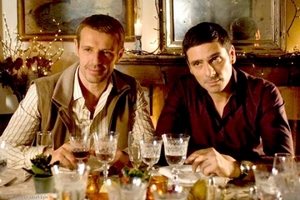Stuart:
This little romantic comedy manages to be a success on the surface, whilst underneath an utter failure.
Manu (Lambert Wilson) and Philippe (Pascal Elbé) are at a crossroads. Up until we meet them, the two men have formed a strong, loving couple, enjoying a stability that most of their friends envy. But when Manu finally puts his foot down and demands they adopt a child, Philippe discards both the notion and Manu quick smart, leaving the latter to come up with his own solution. It soon appears in the form of Fina (Pilar López de Ayala), a young heterosexual woman who is dodging the law in an effort to stay in the country, and the two of them embark on a fairly non-conventional agreement.
It soon appears in the form of Fina (Pilar López de Ayala), a young heterosexual woman who is dodging the law in an effort to stay in the country, and the two of them embark on a fairly non-conventional agreement.
One would think that this film would at the very least break some gender stereotypes. Alas, this isn’t the case. At their worst, these two simply play out roles we’ve seen hundreds of times before. Manu is seemingly oblivious to the needs to Fina, and whilst he’s quite in touch with his own emotions he has no skill whatsoever in reading her. Fina, on the other hand, is naïve and more than a little needy. It’s a pity that the film had to stray so far from the norm (in terms of narrative setup) only to arrive at such a familiar place.
As the story plays out, Manu becomes less and less likeable. In fact, he is revealed to be a selfish prat. At his worst, he seems to treat the much younger Fina as merely The Incubator, though he doesn’t seem to realise this. He denies her requests (which are quite reasonable considering the circumstances) again and again. Even in the closing moments, it appears that he has – unbelievably – gone against her wishes once more. This makes it hard to leave the film feeling that warm glow it seems writer/director Vincent Garenq intended.
This is a drama that misfires wildly, yet if you manage to switch your brain off for a while, it’s quite entertaining. It is a French film, which inevitably means that it’s filled with French people. The French – I’ve come to learn from celluloid – are quite attractive, so at least there is a bit of eye candy for everyone. It’s a good length at 90 minutes and the performances are perfect, it’s just such a pity it doesn’t stand up under much scrutiny. Instead of being radical or even eye opening, it’s surprisingly old-fashioned with its gender representations. If Manu had stopped to think of Fina more often, then I may have liked him – and thus Baby Love – more.
Rating: